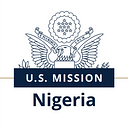Working Together to Create Nigerian Solutions to Nigerian Challenges
By Zack Taylor — USAID Nigeria Communications Officer

Officials from the U.S. Agency for International Development (USAID), U.S. Centers for Disease Control and Prevention (CDC) and Walter Reed Army Institute of Research (WRAIR) hosted 22 print and online editors and reporters specializing in health at a half-day journalism seminar on October 23, 2019 at the U.S. Consulate in Lagos.
The seminar, themed “Working Together to Create Nigerian Solutions to Nigerian Challenges,” was hosted by Lagos Public Affairs Officer Russell Brooks. Technical presenters included Dr. Laura Chittenden, Country Director of the WRAIR, Halilu Usman, Communications Specialist for the CDC, and Richard Zack Taylor, Development Outreach and Communications Specialist for USAID.

Opening the seminar, Brooks said one of the overarching goals of U.S. assistance to Nigeria is to improve the country’s health systems and ensure the populace has access to quality care they can afford.
“More than half of U.S. development assistance overall goes towards health,” Brooks said, “because those services save lives.” USAID is the U.S. government’s largest foreign development agency, augmented by the CDC, which also works on domestic disease control, and WRAIR, which conducts research relevant to the health of military personnel in the United States and overseas.
“USAID’s priorities in Nigeria’s Health Sector include ending preventable maternal and child deaths and improving nutrition — especially for pregnant women and children,” Taylor said. “We also work to help reduce unmet need for family planning and HIV prevalence among at-risk populations, and above all strengthening health systems, which promises to help with all these issues.”
Since 2015, USAID has invested $1.07 billion to improve health systems in Nigeria. In 2018, USAID’s health budget of $160.5 million represented 35 percent of its assistance to Nigeria, Taylor said. Funding comes from the bilateral USAID budget for Nigeria, in addition to the U.S. President’s Malaria Initiative (PMI) and the U.S. President’s Emergency Plan for AIDS Relief (PEPFAR), implemented by all three agencies.

Last year, $50 million in USAID funds went to maternal and child health, $37 million to reproductive health and family planning, and $3.5 million for good nutrition initiatives, $70 million toward malaria control, and an additional $209 million from PEPFAR for HIV/AIDS relief.
Under PMI, USAID and the CDC have distributed 26 million bed nets, 23 million test kits, 52 million treatment courses, and 14 million doses of medication for pregnant women since 2011. This contributed to a 45 percent decrease in the prevalence of malaria among children under five since 2010, according to the 2018 Demographic and Health Survey.
He said Nigeria has the second-highest TB burden on the continent after South Africa. In response, USAID links adults and children to health services for diagnosis and treatment and has provided more than 400 testing machines to hospitals, which helped identify and treat more than 207,000 undetected cases in 2018.
In his presentation, Usman said the primary responsibility of the CDC is to detect, respond to and prevent current and emerging diseases. Funding for HIV/AIDS-related activities comes from PEPFAR. Since PEPFAR’s launch in 2003, global AIDS-related deaths have fallen by 50 percent, and new infections have fallen 47 percent.

In Nigeria, Usman said, PEPFAR has provided life-saving HIV treatment to more than 800,000 Nigerian men, women, and children living with HIV; HIV counseling and testing services to 7.4 million Nigerians; HIV testing for 1.6 million pregnant Nigerian women; and care and support services for more than 1.2 million orphans and vulnerable children.
He said the CDC is also the lead U.S. agency on health security, confronting global disease threats through advanced computing and lab analysis of huge amounts of data to quickly find solutions. It also puts science into action, tracking diseases and identifying effective ways to prevent it, and bringing new knowledge to health care systems to save lives and improve efficiency of service delivery.

The CDC works to fight diseases before they cross borders, detecting and confronting new outbreaks before they spread enough to threaten the national security of sovereign nations like Nigeria.
“In today’s interconnected world, diseases can spread from an isolated rural village to any major city in as little as 36 hours. Disease knows no borders,” Usman said.
He urged the assembled journalists to demystify conversations around HIV/AIDS, adding that it should not appear as a death sentence since people living with the virus can have long, normal and productive lives through U.S.-funded antiretroviral treatment.
“In most cases, there is nothing mysterious about this disease,” he said.
In her presentation, Dr. Chittenden said that since 2005, Walter Reed’s shoulder-to-shoulder partnership with the Nigerian military has expanded from 11 to 40 health facilities and a research facility focused on vaccine development. U.S. military-to-military support contributes to both soldier health and public health, and helps Nigeria protect itself from foreign aggression.

Dr. Chittenden explained the Walter Reed program provides comprehensive care and laboratory services such as HIV testing, and has expanded to include research studies in HIV and emerging infectious disease, malaria diagnostics, including trials to investigate the efficacy of two Ebola vaccine regimens and a possible new vaccine for Lassa fever. It has also collaborated closely with CDC and Nigerian government agencies on biosecurity.
Responding to a query about media reports of proposed cuts in HIV and AIDS funding, Dr. Chittenden said that Nigeria was not for the time being in danger of losing any development assistance funding tied to the HIV response.
“Nigeria is a leader on the African continent,” Dr. Chittenden said. “In the name of peace, stability, and economic progress in the region, the United States gives high priority to helping Nigeria overcome the challenges it faces.”
